Are Louisville’s sweeping police reforms enough to prevent another Breonna Taylor case?
LOUISVILLE, Ky. – In the wake of Breonna Taylor's death at the hands of police officers a year ago, Louisville has embraced a series of sweeping and historic police reforms.
It banned no-knock search warrants that allow officers to burst in unannounced like the one police obtained to search Taylor's home.
It created a civilian review board and inspector general to review questionable actions by Louisville Metro Police and is lobbying to grant them subpoena power.

It hired a new chief who has vowed to police Black and white neighborhoods the same.
It paid tens of thousands of dollars for a consultant's top-to-bottom review that recommended 102 fixes for a police department it deemed "in crisis."
And it has weighed or considered additional changes – some that go beyond policing to address the root causes of poverty and violence.
But the question persists: Will it be enough?
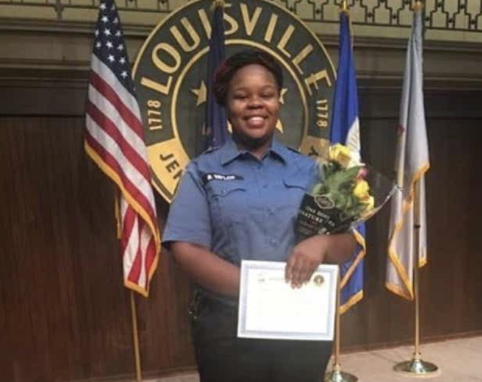
Will it stop another tragedy like the death of Taylor, a 26-year-old Black ER tech who was unarmed when she was shot in her apartment March 13, 2020?
Will it begin to restore faith in law enforcement in a Black community that has been subjected to overpolicing and unequal treatment for decades?
In the year since Taylor's death, officials have scrambled to respond to the anger that has spilled onto Louisville's streets – sparking more than 180 consecutive days of protest from those demanding racial justice and promises of more demonstrations to come.
They want results. Now.
"Breonna was our boomerang. Breonna was the Black people's 9/11," protester Stachelle Bussey said. "Because of Breonna, things ... will no longer be the same.
"We are serious about this, about not just settling for one thing."
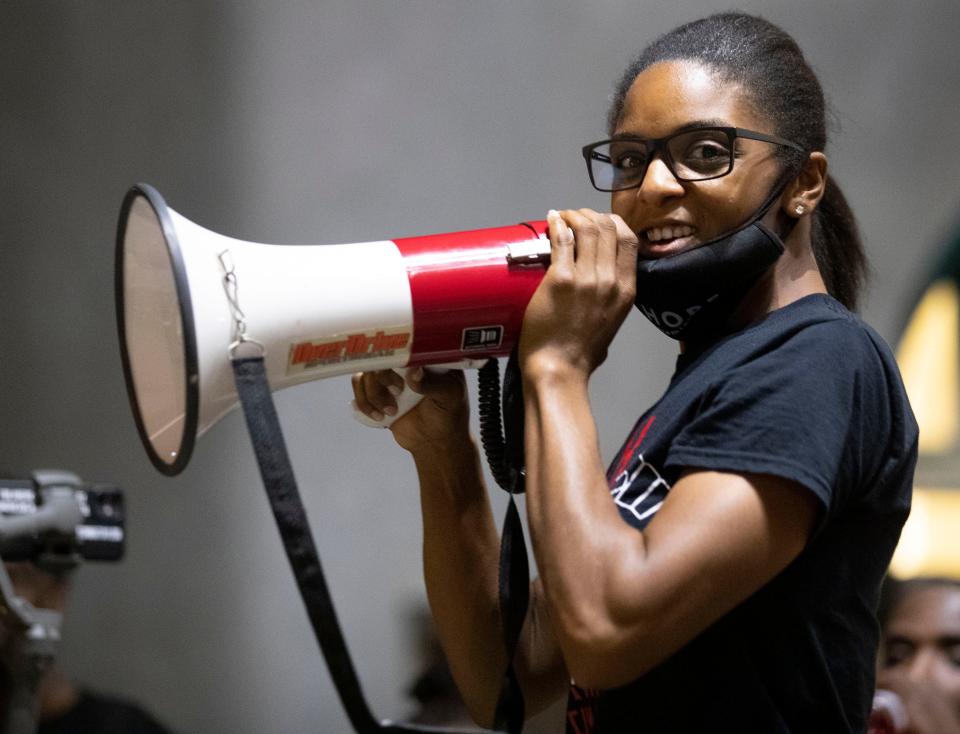
Khalilah Collins, a Louisville native who has participated in demonstrations, said attention in the coming year will center on putting accountability behind the reforms that have been promised – as well as challenging the systems that have been holding back Louisville's Black residents.
"What we're seeing is people awakening to what's going on. That's going to be part of her legacy: people standing up for what they believe in and challenging systems in a way Louisville has never seen," Collins said.
"Reforms that have been suggested and implemented is part. But we're not done yet."
'She was caring': A beloved sister becomes a symbol of pain, an icon of hope
Some of the reforms could have an effect on the way searches are conducted in Jefferson County.
But other measures have lagged or face significant obstacles before they can be implemented.
Still others hinge on how effectively they're used and monitored.
Louisville Mayor Greg Fischer, who has been a target of protesters' anger, told The Courier Journal "we'll never know" if the reforms the city has adopted could have prevented Taylor's death had they been in place.
But he says the city is more aware of the broader problems Taylor's death exposed, and he predicts the most powerful aspects of the change the community has demanded are still to come.
"I think people are looking more broadly at what public safety is now," he said. "It's not just the enforcement of police – it's intervention, it's prevention, it's reentry.
"The broadening of the lens, as to what public safety is and how we're all involved in producing that … I hope is going to be (the) ultimate legacy of Breonna's to come out of all this."
Here's a more in-depth look at the reforms Louisville has adopted and their expected impacts.
Breonna’s Law, body cams and SWAT
Failings exposed in Breonna Taylor case spark policy changes
The seven narcotics officers who lined up outside Taylor's door to search her home for drugs and cash after midnight March 13 weren't using body cameras to record what happened.
There's evidence to suggest they hadn't run an operation plan past SWAT.
And most had little or no involvement in the underlying narcotics investigation that prompted the search warrant for Taylor's South End apartment.
Lt. Shawn Hoover, the highest-ranking officer on-scene that night, told Louisville Metro Police investigators later that he hadn't checked to see if a risk assessment had been done in advance, saying it wasn't "our investigation."
"We were assist, and they needed bodies," Hoover said, later agreeing with the description that it was a "hodge podge team."
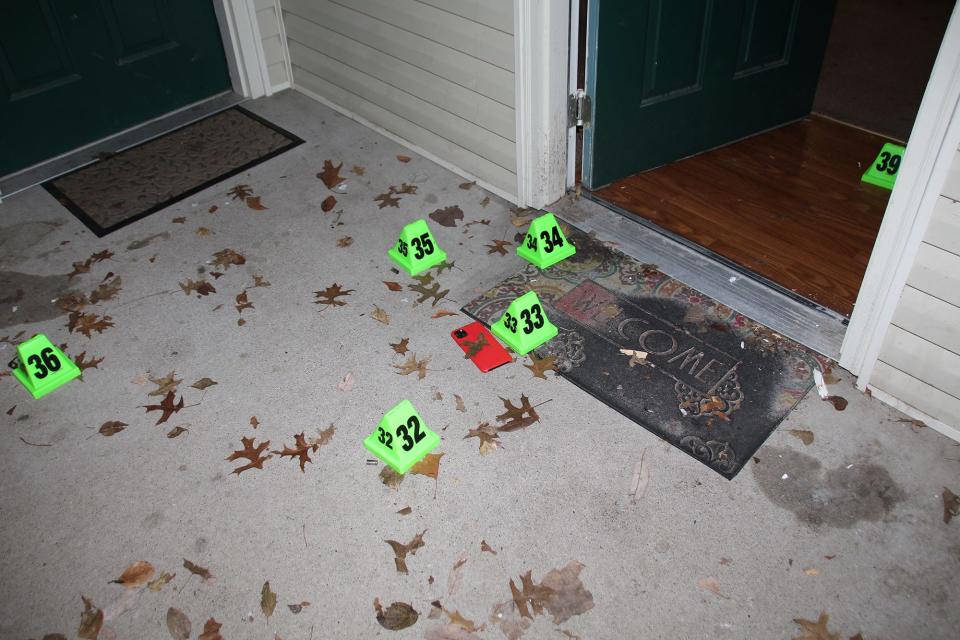
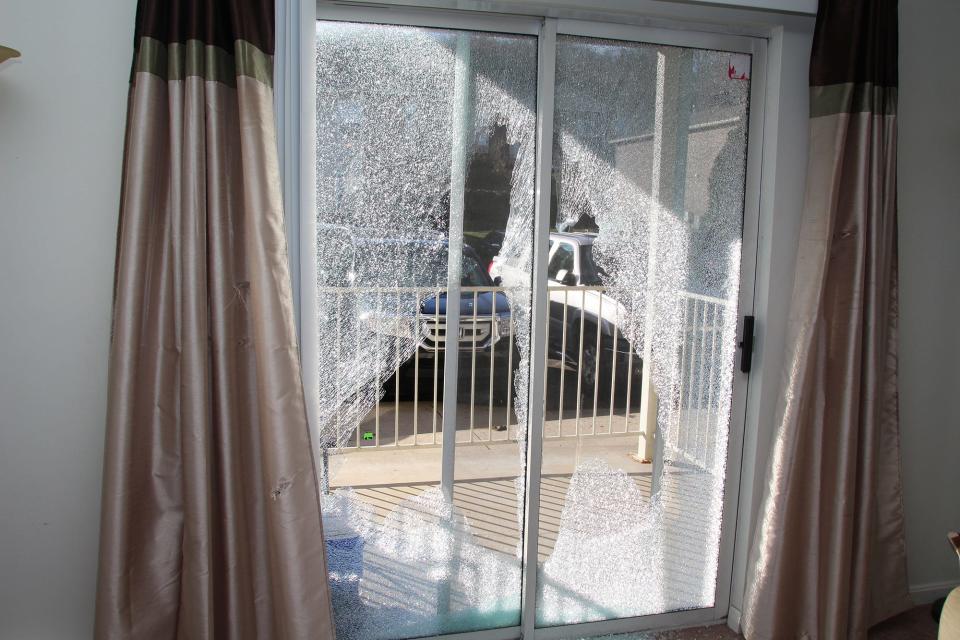
That won't be the case moving forward after reforms took aim at Louisville police mistakes identified in the wake of the raid.
"Breonna's Law," the Louisville ordinance passed in June, banned no-knock search warrants in Louisville and now requires all officers serving search warrants to wear body cameras and record footage.
It also addresses announcements for other types of search warrants, requiring officers using a search warrant to first knock and announce their presence "in a manner that can be heard by the occupants," then at least 15 seconds "absent exigent circumstances" before entering.
Moreover, a commanding officer must now review and approve search warrant affidavits and risk assessments before detectives take a warrant to a judge.
If those changes had been in place for Taylor's case, supervisors might have flagged the misleading information about suspicious packages included in Detective Joshua Jaynes' search warrant affidavit, which later led to his firing.
Then-Chief Yvette Gentry called the information in the affidavit "not truthful," adding that officers shouldn't have to be trained to tell the truth.
It also could have meant reassessing whether to involve the better-trained SWAT team, which warned against including her home that night in a series of drug raids.
More: SWAT team told investigators raid on Breonna Taylor's home was 'just an egregious act'
"Had they done their job and created a risk matrix before actually executing the warrant, it would have crossed enough eyes and crossed enough desks for them to realize that either the matrix was improperly filled out or that it needed to go past SWAT," said Taylor family attorney Sam Aguiar, whose legal team successfully pushed for the search warrant reforms in its $12 million settlement with the city.
"We'd like to think SWAT would have said, 'We already told you: This is not happening tonight. We're going to take our time.'"
Other recommendations in the Hilliard Heintze report for search warrants, when implemented, would:
Require commanding officers to consult a SWAT team commander or designee before applying for and executing any search warrants at locations where officers could encounter individuals, regardless of risk factor.
Mandate a written operational plan before a search warrant's execution, regardless of SWAT's involvement.
Consider eliminating nighttime search warrants, unless a judge determines it is necessary.
Develop protocols for commander-led debriefings or after-action assessments of plans and operations.
Dave Mutchler, a spokesman for the River CityFraternal Order of Police lodge that represents Louisville police officers, said the police union doesn't believe Breonna's Law would have stopped Taylor's death, instead blaming Taylor's boyfriend.
"The only thing that would've stopped the shooting in this circumstance would've been if Kenneth Walker hadn't shot at police officers, who were forced to return fire," Mutchler said.
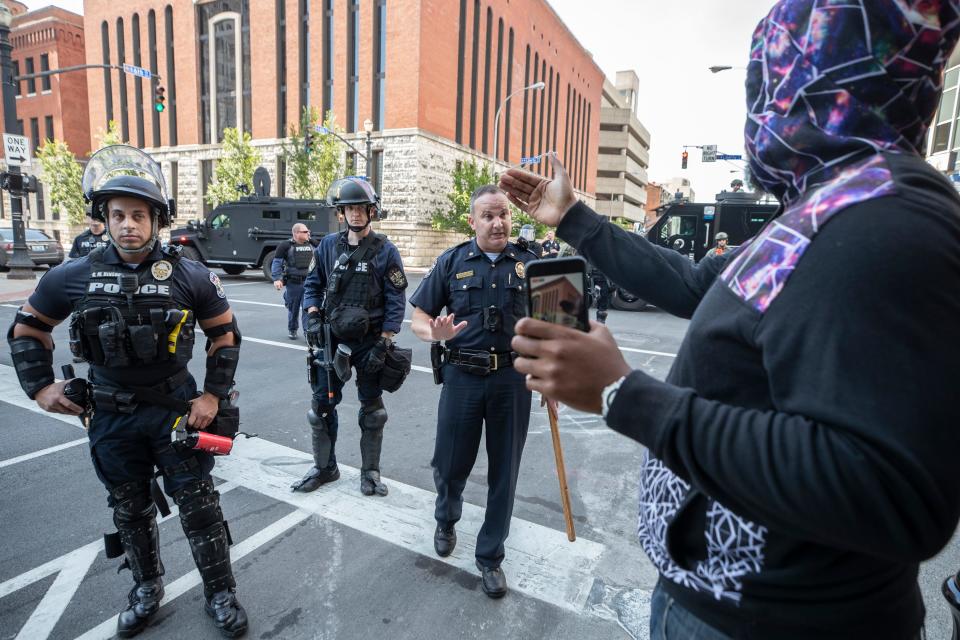
Who is responsible? Boyfriend and officer blame each other
Only a "small number" of no-knock search warrants were served, he argued, so stopping them won't have a "drastic" effect on overall search warrants.
Still, there's a statewide push to address no-knock search warrants, with two bills filed this legislative session.
One, "Breonna's Law" from Rep. Attica Scott, would ban them outright.
The other from Republican Senate President Robert Stivers would ban no-knock searches from 10 p.m. to 6 a.m. without "clear and convincing" evidence found by a judge.
Scott's has not been heard in committee, while a committee passed Stivers' last month.
Civilian review and a push for subpoena powers
Historic steps toward oversight hinge on implementation
An investigation into the events of March 13 began swiftly after Taylor's death.
The Louisville police department's Public Integrity Unit conducted an investigation that was later sent to the Kentucky attorney general and, in part, led to a grand jury indicting former detective Brett Hankison for shooting into an occupied neighboring apartment.
That investigative process will be scrapped moving forward – instead, Fischer will turn over future officer shooting investigations to the Kentucky State Police.
Additionally, a new civilian review board and office of inspector general have been created to review police actions.
Louisville officials have also been pushing for subpoena powers for that board from the state Legislature, a shift from the prior review board critics dismissed as "toothless."
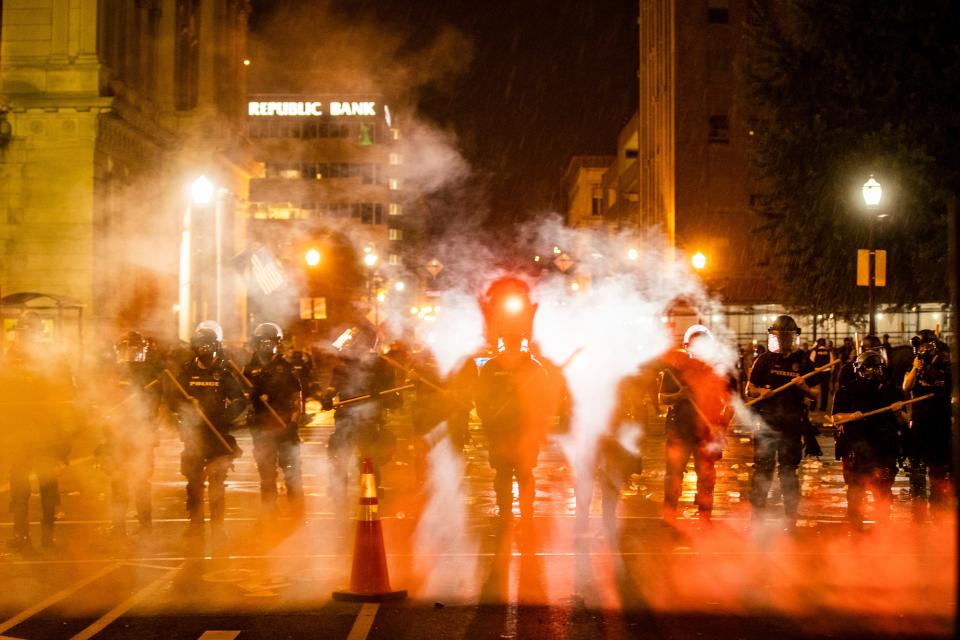
How significant both changes will be hinges on the next steps.
Samuel Walker, a professor emeritus at the University of Nebraska Omaha's School of Criminology and Criminal Justice, said sending shooting investigations to an independent reviewer is part of a nationwide trend but doesn't necessarily guarantee a better result.
"You've got to make sure that agency has a good reputation for independent, professional-level investigations," said Walker, who has written 14 books on policing and criminal justice policy.
Walker praised the addition of an inspector general but said success could depend on staffing and subpoena powers.
"They've got to get the evidence, the facts of the matter," he said.
A bill in the Kentucky General Assembly would grant the civilian review board a path to subpoena power through the Metro Council's Government Oversight and Accountability Committee.
But critics say that would strip the board of its power and hinder transparency.
Another state bill, proposed by a Democratic lawmaker, would give a more direct route for subpoenas through the inspector general. It passed out of a committee last week.
Collins, the Louisville native who now splits her time in Louisiana, said creating the board and inspector general was a "step in the right direction," so long as it wasn't simply ceremonial.
"They need to have the ability to do their jobs," she said, "which should include the subpoena power. They need to not be beholden to LMPD.
"We need to make sure it's representative of the community, as many factions as we can, and that their investigation process is separate and apart from LMPD and the city administration process, as well."
The mayor's office is expected to name its nominations to the review board in coming weeks. A hiring committee, including the chairperson of the review board, would then have the power to select an inspector general.
Fischer, who has called on the General Assembly to give the board direct subpoena powers, said he hopes a "robust civilian review process" can bolster trust.
If the community is not saying policing is legitimate, then it's not, Fischer said.
A campaign to build community trust
New chief and other initiatives seek to repair fractured relationship
Amid outrage and nightly protests over Taylor's death, Louisville entered the market for a new police chief.
Chief Steve Conrad was fired June 1 after police failed to turn on their body cameras during the fatal shooting of David McAtee, a West End barbecue restaurant owner, by National Guard members.
The person selected to replace him was Erika Shields, former chief of Atlanta Police.
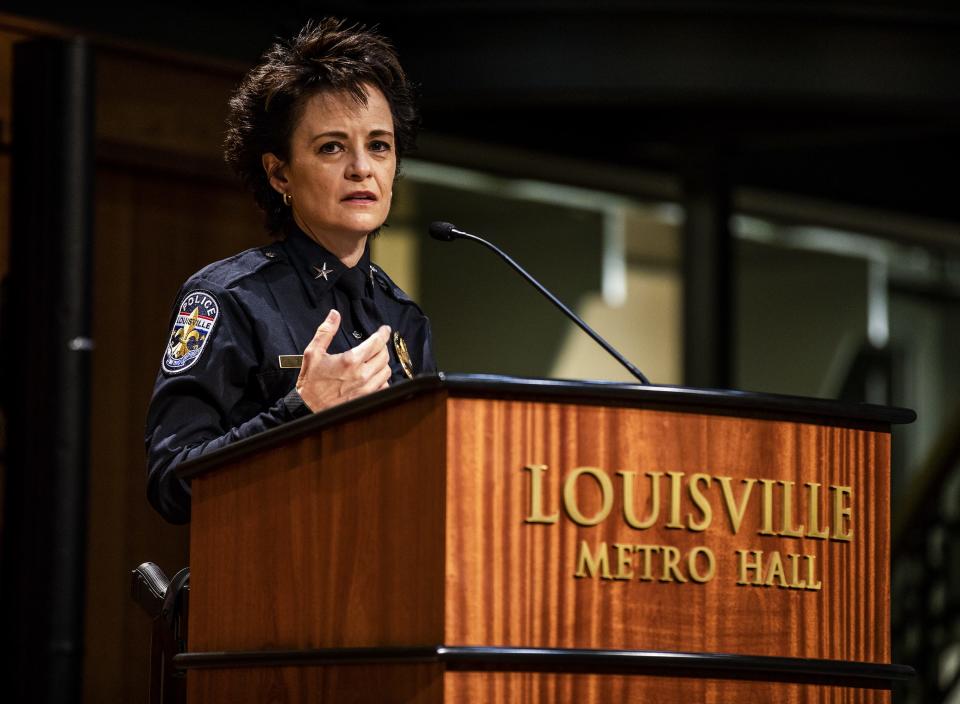
Shields had stepped down in Atlanta after the police shooting of Rayshard Brooks, a Black man who was killed in a scuffle with officers.
Critics derided her selection as tone-deaf and "a slap in the face."
But she has been undeterred, telling The Courier Journal that Louisville Metro Police was the only chief position she applied for because she knew "Louisville has to get it right."
She has welcomed the recommendations in the Hilliard Heintze review, called for a swifter officer disciplinary policy and emphasized the importance of equal treatment regardless of neighborhood.
Steve Romines, an attorney for Kenneth Walker, has insisted Louisville police would have handled Taylor's warrant differently if it had been elsewhere in Louisville.
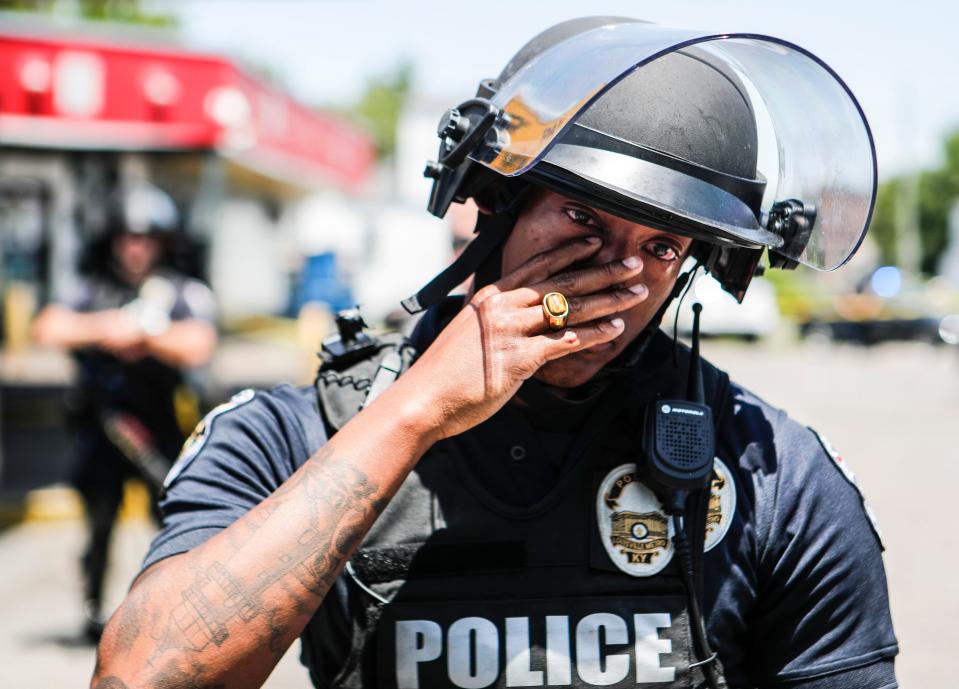
Shields says she knows changing the culture of the department will take time.
In the meantime, she has said she will refocus the department's investigative efforts on intelligence-led cases into violent crimes and illegal guns, rather than chasing low-level drug crimes.
"It is imperative that our focus be on those individuals driving violence in the communities," she said. "It can't just be an all-out, 'Well, we'll just figure this out as we go,' and go 100 miles per hour. There has to be a thoughtful approach to reining in gun violence."
How much that posture would have helped avoid the Taylor shooting last year is up for debate. The Place-Based Investigations Unit that conducted the narcotics investigation that led police to Taylor's door is still in operation, the Louisville police department said in mid-February.
The unit is intended to focus on interrupting crime in a small geographic areas, in cooperation with other city agencies. A Louisville police spokeswoman declined to provide details on its current area of focus.
To Taylor's legal team, failings in the case went beyond technical missteps or policy gaps. It was bigger: a disconnect between community and police.
To that end, the city settlement included several community-oriented policing efforts:
Incentivizing officers to live in areas of the city where half or more of households are low-income, where 60% are below the area median income or where there the poverty rate exceeds 25%;
Encouraging officers to volunteer two hours per pay period at an organization in the community they serve;
Exploring the hiring of social workers for officer support and assistance on some dispatched calls. (The city has contracted out a study of the feasibility of sending some 911 calls to nonpolice services such as mental health therapists, substance abuse counselors or social workers.)
Another big piece: getting the police department's early warning system, or early intervention system, operating to begin flagging problem officers.
Aguiar believes that had the department's IAPro warning system been functioning before March 13, 2020, then "multiple" detectives from that night would've been flagged before Taylor's shooting.
"It's a system that is going to cultivate, mentor and monitor to correct potential problematic behavior before it happens," he said. "That's what saves lives."
Collins said it's important that the public be involved in determining what problem behaviors ought to be flagged for officers.
"The police can't police themselves. We learned that the hard way," she said. "We need to figure out a different way, and figure out red flags before they harm somebody."
Breonna’s legacy and putting teeth behind reforms
What’s ahead for Louisville?
The progress Louisville sees from the reforms depends on how diligent police and city officials are in following them, Aguiar said.
If officers take advantage of the opportunity to live in police divisions and start volunteering, for instance, it could lead to appreciation that "these are individuals that are their neighbors, the ones they went into policing to protect," he said.
Other reforms, such as Breonna's Law, depend upon how stringently officers serving search warrants are monitored by watching their body camera footage, Aguiar said.
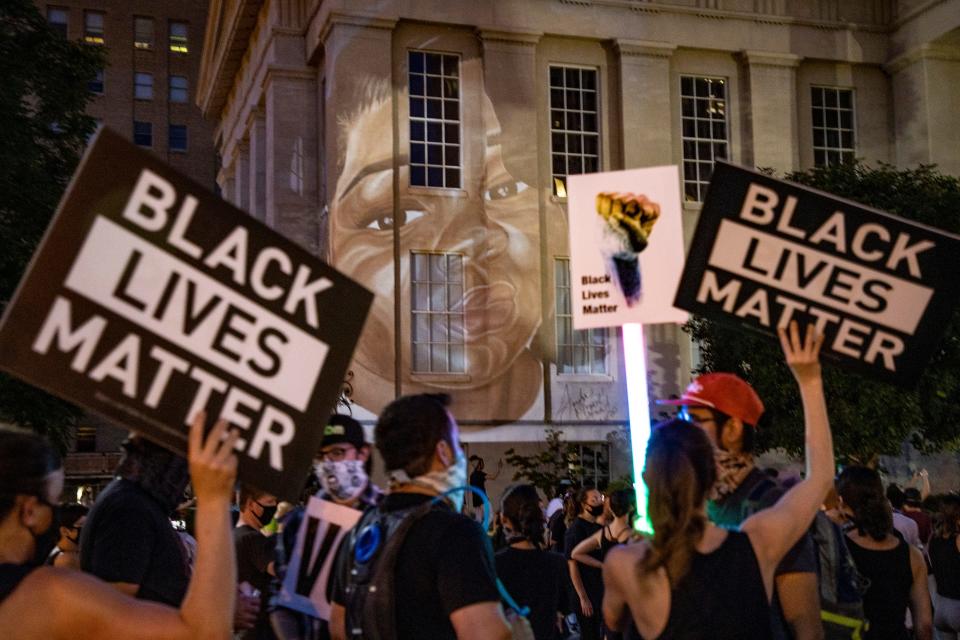
"The legislation is great, but these officers also need to be monitored and they need to be held accountable," Aguiar said. "These body cameras need to be watched. The policy and law is only as good as its enforcement."
Community organizers agree there's much more work to be done in ensuring accountability.
To Bussey, that would mean passing Scott's Breonna's Law statewide and making sure Taylor's name is never forgotten. The bill goes far beyond Taylor, she said; it's about every person stopped by police or followed because they are Black.
"There are no consequences," Bussey said. "Where there is no fault admitted, failure is always likely to happen again."
To Collins, that accountability will come from the community, not the city or police.
"We cannot let the administration or LMPD continue to be checks and balances," she said. "We have to create new systems, because the ones we have just don't work. Period."
Even Walker, the policing expert from University of Nebraska Omaha, who praised the reform initiatives and review's recommendations, said it's vital for independent voices to provide public updates on progress.
The new police chief, Walker suggested, ought to institute regular public meetings with progress reports. And an inspector general, when named, could monitor the recommended fixes and "not be afraid to be critical."
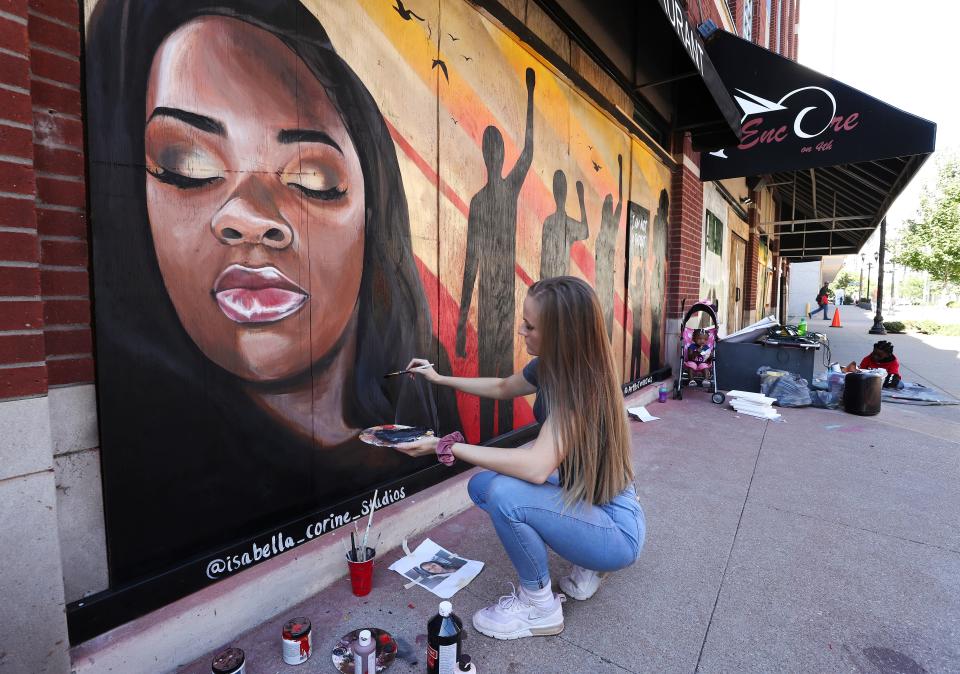
"There are a lot of good things here, the full picture," Walker said.
More: Georgia teacher faces backlash after blaming Breonna Taylor for her own death
Fischer, asked where Louisville was in working toward these goals, told The Courier Journal, "You can't put a timeline on healing."
"I think we have begun," he said. "I hope that people see that we've made commitments. I want them to hold us accountable and be part of the solution."
Collins said the people will demand the city be accountable, just as they demanded the reforms.
"People came out en masse, and were not letting up – and still aren't letting up," she said.
"The people demanded these things. The people demanded this."
Reach Darcy Costello on Twitter: @dctello.
This article originally appeared on USA TODAY: Breonna Taylor: Would Louisville's police reforms have saved her?

